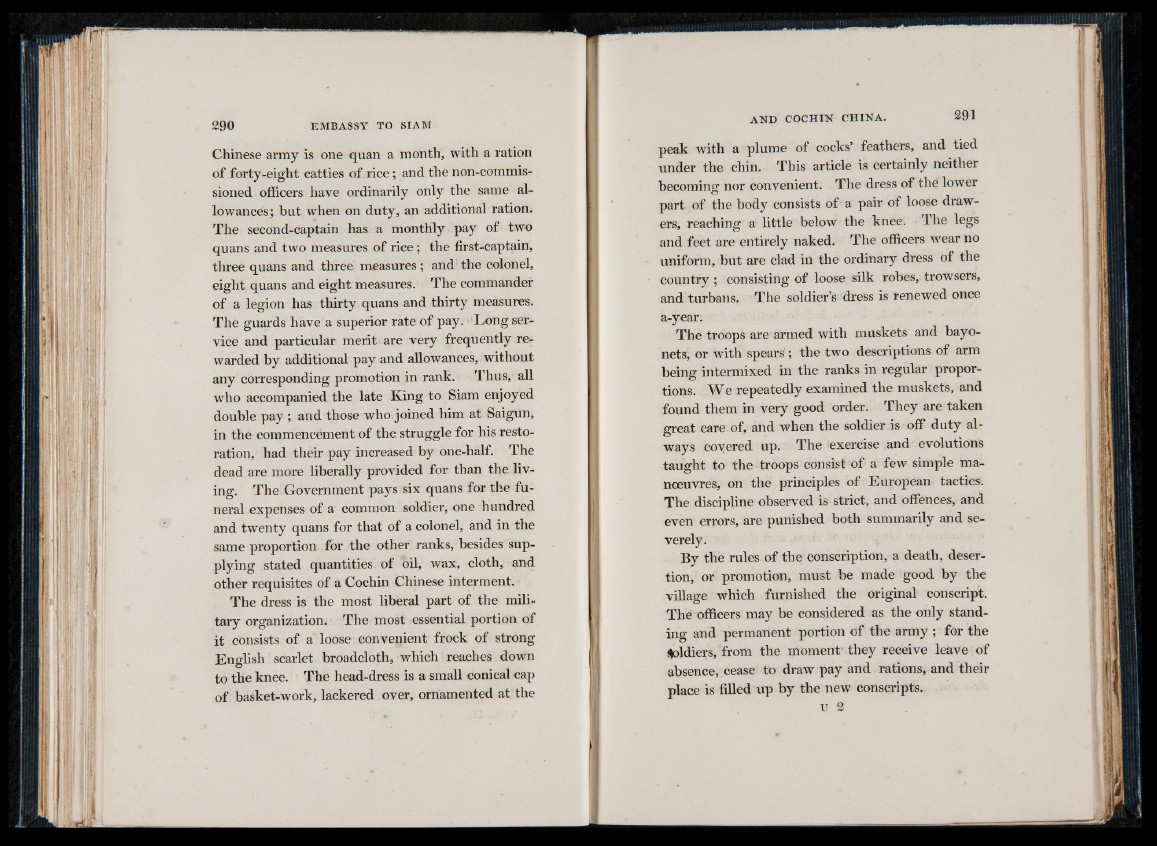
Chinese army is one quan a month, with a ration
of forty-eight catties of rice; and the non-commissioned
officers have ordinarily only the same allowances;
but when on duty, an additional ration.
The second-captain has a monthly pay of two
quans and two measures of rice; the first-captain,
three quans and three measures; and the colonel,
eight quans and eight measures. The commander
of a legion has thirty quans and thirty measures.
The guards have a superior rate of pay. Long service
and particular merit are very frequently rewarded
by additional pay and allowances, without
any corresponding promotion in rank. Thus, all
who accompanied the late King to Siam enjoyed
double pay ; and those who joined him at Saigun,
in the commencement of the struggle for his restoration,
had their pay increased by one-half. The
dead are more liberally provided for than the living.
The Government pays six quans for the funeral
expenses of a common soldier, one hundred
and twenty quans for that of a colonel, and in the
same proportion for the other ranks, besides supplying
stated quantities of oil, wax, cloth, and
other requisites of a Cochin Chinese interment.
The dress is the most liberal part of the military
organization. The most essential portion of
it consists of a loose convenient frock of strong
English scarlet broadcloth, which reaches down
to the knee. The head-dress is a small conical cap
of basket-work, lackered over, ornamented at the
peak with a plume of cocks’ feathers, and tied
under the chin. This article is certainly neither
becoming nor convenient. The dress of the lower
part of the body consists of a pair of loose drawers,
reaching a little below the knee. I h e legs
and feet are entirely naked. The officers wear no
uniform, but are clad in the ordinary dress of the
country ; consisting of loose silk robes, trowsers,
and turbans. The soldier’s dress is renewed once
a-year.
The troops are armed with muskets and bayonets,
or with spears ; the two descriptions of arm
being intermixed in the ranks in regular proportions.
We repeatedly examined the muskets, and
found them in very good order. They are taken
great care of, and when the soldier is off duty always
coyered up. The exercise and evolutions
taught to the troops consist of a few simple manoeuvres,
on the principles of European tactics.
The discipline observed is strict, and offences, and
even errors, are punished both summarily and severely.
By the rules of the conscription, a death, desertion,
or promotion, must be made good by the
village which furnished the original conscript.
The officers may be considered as the only standing
and permanent portion of the army ; for the
Soldiers, from the moment'they receive leave of
absence, cease to draw pay and rations, and their
place is filled up by the new conscripts.
U 2